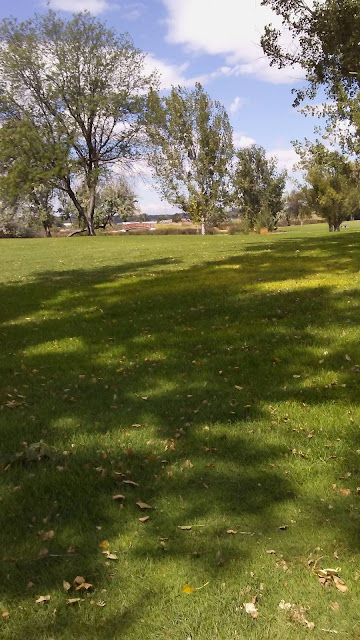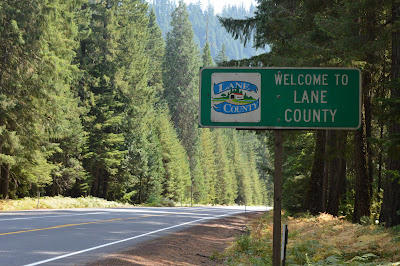Oregon Prayer Spotlight: Ontario
 |
| Ontario, OR park |
Leviticus 19:34
We briefly mentioned the eastern Oregon town of Ontario when we wrote about Malheur County. Today I want to delve into the history a little more, and to honor one long-term resident, my mother-in-law Ila Mae Mills, who passed away August 13th at the age of 97.
Ontario is a town with which I am familiar. My grandparents lived there for many years, from the 1940’s until the 1970’s. My parents were married there, as was I. My in-laws lived in Ontario from 1948 on. My father-in-law, a local bookkeeper, passed away in 2013 at the age of 95.
Ontario is the largest town in the far eastern portion of Oregon and sits right up against the Snake River and the border with Idaho. Population is about 10,000. Treasure Valley Community College (home of the Chukars) opened in 1962. I began classes there in 1967. Holy Rosary Hospital – now St. Alphonsus Medical Center - has long served the community.
Ontario was founded in 1883 and incorporated in 1899. The Oregon Shortline Railroad built through Ontario in 1884 helped the little community to grow, and a stockyard was established there that became one of the largest in the West. For many years my father-in-law was the bookkeeper for the Ontario stockyard. The construction of irrigation canals and ditches increased the agricultural productivity of the region as well, and Ontario soon became a small, but prospering, town.
One of the fascinating things about Ontario is the cultural diversity. Hispanic or Latino, Native Americans, Basques, Chinese, and Japanese contribute extensively to Ontario’s mix of cultures. The community ranks seventh in the state for diversity. When I lived there in the late 60’s, my grandmother’s neighbors included a Chinese couple. The wife was a small, elderly woman who, I noted, hobbled when she walked. As a girl in China, my grandmother told me, her feet had been bound. That fascinated me, so I did some research and found foot-binding, a rather barbaric custom, had been outlawed in China in 1912, but actually continued to be carried on for several decades afterwards. The woman sometimes had tea with my grandmother, but I never had a chance to know her, so never learned the details of her story.
The Basque population is also unique, fascinating and – I’m guessing – not well known. The Basques are a group whose homeland is on the Iberian Peninsula at the foot of the Pyrenees Mountains. They are well-known sheepherders and have managed to maintain their culture even in the high desert of Idaho and eastern Oregon. They came to the Ontario area with the railroad around the turn of the century. There is a Basque museum in Boise, Idaho.
Additionally, Elmo Smith, the mayor of Ontario, let it be known that the city of Ontario would welcome the Japanese. (“Send them along!” he said.) He made Ontario a sanctuary city. The Japanese displaced from their homes and businesses on the west coast were welcomed in Ontario. As far as I can find out, Ontario is unique in this, as all other western communities were prejudiced against Japanese during the war years. A large community of Japanese farmers was completely driven out of the Yakima region, for example, and many towns refused them service, housing and jobs. Not Ontario.
The mayor and other leaders in Ontario worked together during and after the war to find homes, jobs, and businesses for the Japanese. A local realtor helped them buy farms; the Chevrolet dealer hired Japanese mechanics. Mayor Elmo Smith, a newspaperman by trade (and later governor of Oregon), used his newspaper to write positive editorials and accounts of the Japanese people, countering some of the prejudice and xenophobia.
By the time I knew Ontario, in the late 1950’s, it had the largest per capita Japanese population of any
 |
| Ducks in Ontario, OR park |
How do we pray for Ontario?
Ontario has its struggles these days. It has a high drug abuse rate, domestic violence and poverty. Some reports list it as one of the most dangerous cities in the state, due to property crime. Pray for the current leadership. Ontario has a manager/council form of government. The City Manager is Adam Brown while the Mayor is Riley Hill. There are six council members. The City Attorney is Larry Sullivan. The Chief of Police is Steven Romero.
Then the King will say to those on His right hand, ‘Come, you blessed of My Father, inherit the kingdom prepared for you from the foundation of the world: for I was hungry and you gave Me food; I was thirsty and you gave Me drink; I was a stranger and you took Me in; I was naked and you clothed Me; I was sick and you visited Me; I was in prison and you came to Me.’
Matthew 25: 34-36



Comments
Post a Comment